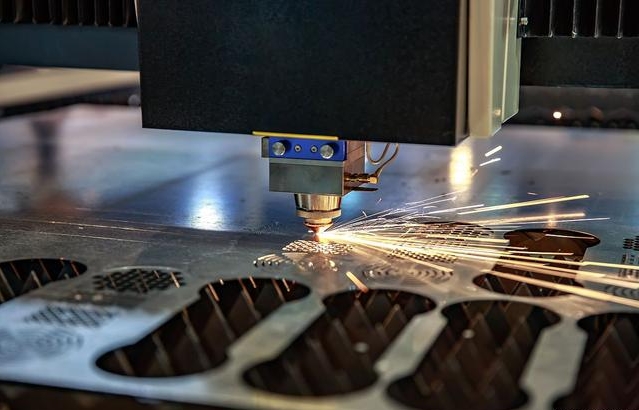Industrial Internet: Networked Production Revolutionizing Sheet Metal Processing+ View more
Industrial Internet: Networked Production Revolutionizing Sheet Metal Processing
+ View more
Date:2023-12-17 11:05
The networked ecosystem of interconnected machines and systems that is called the Industrial Internet has been a big player in transforming the market for sheet metal processing. This article looks at how the Industrial Internet impacts five areas that are very important to the sheet metal industry: production, efficiency, maintenance, connectivity, and the digital future. The Industrial Internet works its magic in those five areas through the optimization and control of interconnected systems—namely, the machines that the act of sheet metal processing requires. When people say that the Industrial Internet has a "paradigm shift" effect, they mean that it has fully enabled a new way of thinking and operating with the machines used for manufacturing that sheet metal.
Sheet metal processing plants can now harness the power of the Industrial Internet when it comes to predictive maintenance. Machine learning algorithms and analytics on big data enable Health Monitoring Systems (HMS) to keep tabs on the vitality of factory equipment. While the services that the HMS performs can be profound, we would like to offer here a brief overview of what an HMS can do. First, the HMS uses machine learning to analyze any number of signals emitted during the operation of machinery. It uses those signals to assess the health of a machine continuously. If the HMS concludes that the machine is no longer healthy, it sends alerts to the appropriate personnel. ...
The idea of digital twins has shaken up the optimization of processes in the sheet metal industry. They are replicas of real-world manufacturing systems that can be run in "what-if" simulations. Manufacturers can use them to model and predict the behavior of their processes under various conditions and to spot potential issues before they become real problems. The supply chain of the sheet metal industry can be seen as an interconnected web of systems that allows for complete visibility and traceability of every part of the process, from the procurement of raw materials to the shipping of finished products. The Industrial Internet of Things makes this web possible and also drives the unprecedented level of transparency the supply chain now has.
Sheet metal processing is a cybersecurity concern because the Industrial Internet ties it to so many other interconnected systems. Anything that threatens the cybersecurity of the Industrial Internet threatens it, too. So robust, smart, and layered cybersecurity is essential for sheet metal processing. At the same time, it is vitally important for the humans who do this work and for the AR-based training systems that prepare them to work with smart, collaborative machinery in a digitally interlinked world.
Even with the enormous advantages that the Industrial Internet brings, we still have to deal with several challenges: data privacy, system interoperability, and a workforce skilled enough to operate the new-generation systems. We need to work together—industry stakeholders, technological innovators, and policymakers—to overcome these problems. Fortunately, the Industrial Internet's evolution in sheet metal processing promises not just to push past these obstacles but also to pay dividends in the areas of innovation, efficiency, and competitiveness. What we are talking about with the Industrial Internet in sheet metal processing is not just a digital revolution but also a substantial change in interconnectedness and optimization, increasing both productivity and adaptability across the industry.
Sheet metal processing plants can now harness the power of the Industrial Internet when it comes to predictive maintenance. Machine learning algorithms and analytics on big data enable Health Monitoring Systems (HMS) to keep tabs on the vitality of factory equipment. While the services that the HMS performs can be profound, we would like to offer here a brief overview of what an HMS can do. First, the HMS uses machine learning to analyze any number of signals emitted during the operation of machinery. It uses those signals to assess the health of a machine continuously. If the HMS concludes that the machine is no longer healthy, it sends alerts to the appropriate personnel. ...
The idea of digital twins has shaken up the optimization of processes in the sheet metal industry. They are replicas of real-world manufacturing systems that can be run in "what-if" simulations. Manufacturers can use them to model and predict the behavior of their processes under various conditions and to spot potential issues before they become real problems. The supply chain of the sheet metal industry can be seen as an interconnected web of systems that allows for complete visibility and traceability of every part of the process, from the procurement of raw materials to the shipping of finished products. The Industrial Internet of Things makes this web possible and also drives the unprecedented level of transparency the supply chain now has.
Sheet metal processing is a cybersecurity concern because the Industrial Internet ties it to so many other interconnected systems. Anything that threatens the cybersecurity of the Industrial Internet threatens it, too. So robust, smart, and layered cybersecurity is essential for sheet metal processing. At the same time, it is vitally important for the humans who do this work and for the AR-based training systems that prepare them to work with smart, collaborative machinery in a digitally interlinked world.
Even with the enormous advantages that the Industrial Internet brings, we still have to deal with several challenges: data privacy, system interoperability, and a workforce skilled enough to operate the new-generation systems. We need to work together—industry stakeholders, technological innovators, and policymakers—to overcome these problems. Fortunately, the Industrial Internet's evolution in sheet metal processing promises not just to push past these obstacles but also to pay dividends in the areas of innovation, efficiency, and competitiveness. What we are talking about with the Industrial Internet in sheet metal processing is not just a digital revolution but also a substantial change in interconnectedness and optimization, increasing both productivity and adaptability across the industry.
Share to:
Recommend wonderful blog posts

